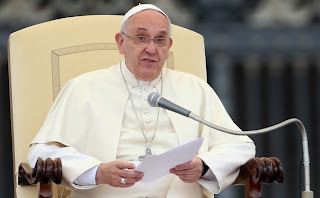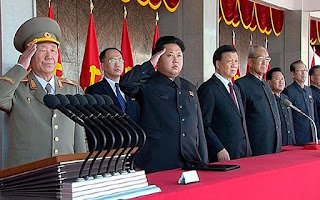Opinion on the New Vatican Treaty Recognizing the state of Palestine
Opinion
on the New Vatican Treaty Recognizing the ‘state of Palestine’
By E. Stanley Ukeni
On Wednesday, May 13th 2015, news broke
that the Vatican has officially ratified a treaty that officially recognizes
the state of Palestine. That caught my attention, as an interesting development
worthy of further pondering, and intense analysis. My interest is primarily born
of my knowledge that this piece of territory is of historic and spiritual
significance to three major religions of our world. As I read the news story, I
was particularly interested in the reactions of diverse groups—who holds varied
opinions on the prospect of a Palestinian statehood, to this intriguing
diplomatic initiative by the Hold See.
Expectedly, the bold diplomatic move by the Vatican
immediately drew the ire of the detractors of the Holy See, and the guarded
condemnation of supporters of the Jewish State of Israel—many of whom are expressing
the opinion that the new treaty would hurt the prospects of peace between the
Israelis and the Palestinians rather than help the peace process. Well, the
jury is still out on that theory. We hope to God that they are wrong in that
analysis of this move being an impediment to peace in the Middle East. Nobody
wants any more bloodshed in that already volatile region of our world. Any
astute observer of world events knows that the need for peace in our world is
more urgent now more than ever before in our recent history.
It is quite understandable that supporters of the
Jewish State, like The American Jewish Committee and The Anti-Defamation
League, would be averse to this bilateral treaty between the Vatican and the
Palestinian leadership. However, their opposition to the Vatican’s diplomatic
initiative to ratify does not in any way diminish the constructive roles
they’ve played in advancing peace in the Middle East, and around the world.
I am sure that there are political pundits—within
and outside the corridors of power in the United States, who would soon be
advancing the flawed hypothesis that this Vatican move is a sign of a broader
European strategy to wrestle the initiative of the stalled United States-led
efforts to negotiate an Israeli-Palestinian deal on the terms of Palestinian
statehood. Some of these political commentators might even go as far as
speculating that other European Union countries with United Nations voting
rights, may soon follow the lead of the Vatican and recognize the state of
Palestine—a move that would put intense diplomatic pressure on the Israeli
government to return to the negotiating table. However, there is no real
evidence to suggest that this is the case here.
To be honest, I will not be the least bit surprised
to hear messianic religious commentators assign apocalyptic significance to
this Vatican diplomatic move. But nothing can be further from the truth. There is
no messianic conspiratorial theory to be had here period. So, don’t even go
there. This is in no way a conspiracy against Israel or the Jewish people. It
is purely a political decision, aimed at primarily advancing the interests of
the Catholic Church in the Holy land.
This development is purely a political maneuver to
ensure that Christians the world over continue to enjoy unfettered access to
the many Christian historic and religious site within the Palestinian
territory. Indeed this treaty, which primarily concerns traditional and spiritual
interests of the Catholic Church in the Palestinian Territory, is a very
symbolic political initiative that unambiguously indicates that the Holy See
has altered its strategic diplomatic position on the viability of a Palestinian
State.
However, it is worth noting that has long embraced
the idea of a Palestinian state since the 2012 United Nations’ general assembly
vote recognized Palestine as a state—with non-member observer status, and have
since then referred to the official Vatican representative of the Palestinian
government as the representative of the State of Palestine, in its annual
directory. In essence, while this will be the first time the Roman Catholic
Church have entered into a treaty with the state of Palestine, the Vatican has unofficially
recognized the State since February of 2013.
I suggest that this treaty be viewed from the prism
of the Vatican’s important global political status as the widely accepted moral
conscience of the world—a status which derives its impetus from the spiritual
eminence of the Holy See. This important moral status, I believe, informs the
Vatican’s fundamental intention to advance Israeli-Palestinian reconciliation
through this diplomatic recognition of the state of Palestine.
As the Palestinians celebrate this important treaty
as a strategic victory in their long quest for international recognition as a
sovereign people, they must collectively begin to eschew violence as a
legitimate and viable instrument of their struggle for self-determination. They
should rather, embrace the path of none violent struggle as the only viable
means of realizing their deep aspiration for an independent Palestinian homeland
that exists side by side, and at peace with the State of Israel .



%2Btalks%2Bwith%2BPalestinian%2Bpresident%2BMahmud%2BAbbas%2Bduring%2Ba%2Bprivate%2Baudience%2Bat%2Bthe%2BVatican%2Bon%2BOctober.jpg)


Comments
Post a Comment